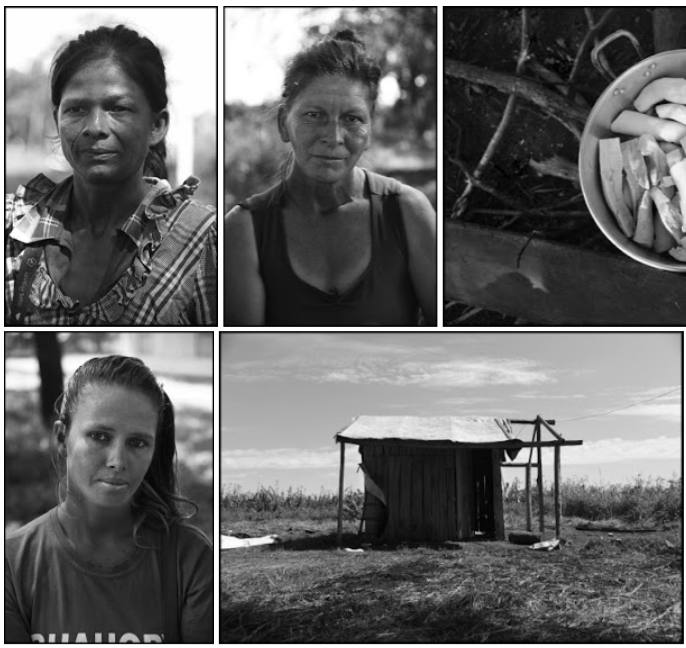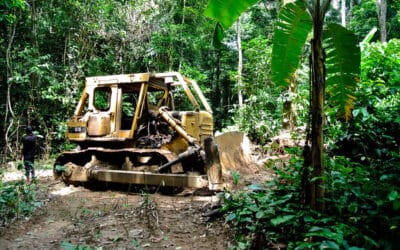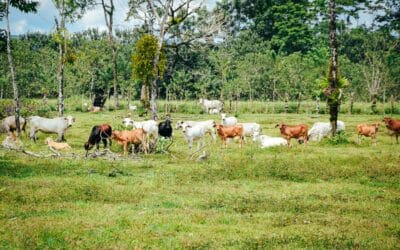A World Food Sovereignty Day photo-essay about the impacts of toxic agribusiness in Paraguay and the EU-Mercosur free trade agreement
By Fernando Franceschelli and Ines Franceschelli, Henoi and Global Forest Coalition
On World Food Day, we bring you this photo-essay, which tells the story of rural women from the community of Guahory, in Paraguay, and their struggle against the impacts of agribusiness. Although Paraguay is a country with extraordinary natural wealth and a small population of 7 million inhabitants, it is home to 2 million poor and 800,000 malnourished people. Over 1.6 million women of childbearing age suffer from anemia.
These shocking statistics are due to the fact that agribusiness exercises control over our national territory. These corporations have turned Paraguay into an agri-livestock enterprise that produces commodities for export rather than food for local people. Agribusiness occupies 94% of the cultivated land in Paraguay. It has been deforesting and contaminating our lands at a scandalous rate. It has concentrated wealth in the country, to the extent that the richest 10% of the population earns more than 4 times what the poorest 40% earns. They do not respect laws, don’t pay taxes, and claim more than 80% of the wealth produced in our country. For all of this they provide just 2.5% of jobs.
As the political landscape in South America shifts towards an even more ruthless form of neoliberalism, these impacts are set to worsen. Driving this shift is the prospect of the EU-Mercosur free trade agreement between EU and South American nations. Efforts to liberalise international trade in key commodities such as soy and beef will cause more landgrabbing and displacement of rural people, and more deforestation. Women will bear these impacts disproportionately.
Paraguayan women lack access to education and employment, with 40% of families dependent on women to sustain them. But they are also leaders in the struggle against agribusiness, and its unsustainable model of production. This model has been expanding with the complicity of government support, and communities that stand up and fight it are criminalized and persecuted, and their activists are assassinated.
These photos tell the stories of Paraguayan women and their struggles to protect their communities, land and way of life.
A woman from the Guahory community.
“We need to open our eyes, work with our conscience, and recognise our popular power. Together, women and men, for a new country!”
Photo by Fernando Franceschelli
A peasant woman’s feet planted upon the soil.
“What are we going to do without our peasant seeds, what are we going to plant? Genetically Modified Seeds? Our Earth will not end, the money will.”
Photo by Fernando Franceschelli
The further intensification of livestock and feedstock production resulting from the EU-Mercosur trade deal will lead to even more deforestation and ecosystem destruction, harm to communities and Indigenous Peoples, and animal suffering.
“It is necessary to recover our community work. To avoid the use of agrochemicals, mutual solidarity is central. Reforestation, soil recovery, local agricultural fairs, recovering our local food culture are all central to our resistance. it would be good to have a nursery of natural remedies in each organisation and to exchange seedlings”.
Photo by Fernando Franceschelli
A peasant Guahory woman preparing meat for lunch. While the EU-Mercosur free trade agreement will include quotas for agricultural products aimed at boosting beef exports from Mercosur countries to the EU, peasant farmers will find it even harder to practice their traditional and sustainable livelihoods.
“In our communities, there are no schools. Young people are forced to leave the community. Our produce has no price. There are no health services. We have lost our seeds and knowledge. We are losing our most important heritage, our culture.”
Photo by Fernando Franceschelli
A young woman from the Guahory community. Many Guahory have been violently evicted, and their lands taken for monoculture soy production.
“Our major strength for resistance comes from our organisations, our conscience, and our desire to fight. By organising, we have already confronted the police several times to stop chemical pesticide spraying by agribusiness in our territories.”
Photo by Fernando Franceschelli
Peasant women cooking for an “olla popular” (community meal). These community meals are an important space for women to get together and organise.
“We can and we want to provide healthy, chemical free food for our children and families.”
Photo by Fernando Franceschelli
Pictured here is a makeshift house built by community members to live in after their home was destroyed by state security forces in an attempt to evict them.
“In spite of everything we have not stopped producing. Our peasant agriculture cools the planet. We practice crop diversification, use no chemicals, and protect the soils. We resist by conserving our own seeds and fighting for the earth. We resist because we retain our ancestral knowledge; our knowledge is our power.”
Photo by Fernando Franceschelli
This young woman is a victim of aerial crop spraying. Her land is next to a large industrial farm. The EU-Mercosur deal will increase the area of land that is sprayed with pesticides from the air, which will continue to displace local communities and force them away from their traditional ways of life. The EU is trying to frustrate negotiations on a legally binding treaty that would hold Transnational Corporations accountable for the human rights violations triggered by their supply chains.
“The worst are aerial fumigations, chemicals sprayed from airplanes, that affect all our crops. We can stop tractors, but we cannot stop airplanes. Many of our community members are forced to sell their land because of the chemicals on their fields, water sources, and homes. They are forced to live on the edges of cities where they face many hardships.”
Photo by Fernando Franceschelli
A pot of mandioca (cassava) being cooked for lunch. Mandioca is a staple crop for peasant communities in Paraguay. As well as agricultural commodities, the EU-Mercosur agreement also brings control of intellectual property to the table, putting more control into the hands of companies and meaning that peasant farmers could find it harder to share and use their traditional seeds.
“We must improve our agroecological practices. We must seek food sovereignty, abandon the use of pesticides. Instead we can make our own homemade organic pesticides. With training, it is possible to learn how to do all this and become self-reliant.”
Photo by Fernando Franceschelli
Women from the community gather with their children who, like them, will need to organise to protect their land and livelihoods. The EU-Mercosur agreement will tie South American communities in to generations of struggle, compounding the impacts that they already experience.
“The future of the world is in our hands, in the hands of poor women. If it were up to them, we would’ve given up, but we will continue to resist and fight.”
Photo by Fernando Franceschelli














